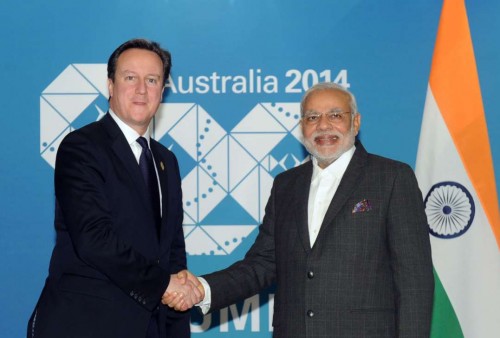
Ahead of the G20 Summit, Indian Prime Minister Narendra Modi held his first bilateral meetings with European Union president Herman Van Rompuy and British Prime Minister David Cameron where economic cooperation topped the agenda — and ended the day with a dinner hosted by Japanese Prime Minister Shinzo Abe.
Modi, who flew down here earlier in the day for the G20 that begins Saturday, first visited the Queensland University of Technology and listened keenly to latest developments in agricultural research, and mingled freely with students and researchers.
Modi held talks with an EU team headed by Rompuy, who said the bloc was keen to “re-engage” with India in all areas, especially trade. Modi told him that the “EU should take advantage of the new economic environment in India”.
An India-EU free trade agreement is yet to be concluded. Negotiations are stuck on key points, including the EU’s demand for significant duty cuts in automobiles and tax cuts on wines, spirits and dairy products, and also a demand for a strong intellectual property regime.
The value of EU-India trade grew from 28.6 billion euros in 2003 to 72.7 billion in 2013. Rompuy tweeted after the talks: “India and EU are strategic partners with vast potential for more cooperation including economic. Good bilateral talks with India PM.”
Modi’s proposal for an international Yoga Day, which he suggested at the UN, got further impetus with Rompuy telling him that the 28-member EU supported his call for a Yoga Day.
About 130 countries have joined as co-sponsors to an India-led UN General Assembly resolution recognizing yoga’s benefits and to commemorate an International Day of Yoga.
Modi’s meeting with Cameron was another highlight of his engagements at Brisbane. Cameron, who is meeting the Indian prime minister for the first time, told him that relations with India were at the “top of the priorities of UK’s foreign policy”.
Also, “Your’s is a very inspiring vision. UK wants to partner in any way we can”, the external affairs ministry quoted the British side as saying.
The ground for better India-Britain relations was laid during the visit by British Foreign Secretary Phillip Hammond and Defence Secretary Michael Fallon to India.
Britain is pushing for the European Consortium to bag the Indian deal for 126 fighter jets with its Eurofighter Typhoon if the Modi government’s negotiations for French Rafale jets falls through. The European Consortium comprises Britain, Germany, Italy and Spain.
Modi will have bilateral meetings with German Chancellor Angela Merkel and Spain’s Prime Minister Mariano Rajoy on the sidelines of the G20. He will also meet French President Francois Hollande, who is likely to push for negotiations to clinch the multibillion-dollar deal for the Rafale fighter jets, which was selected two years ago.
Cameron tweeted: “Meeting with India’s PM… We talked about improving trade links, and I invited him to visit the UK.”
Modi wrote on twitter: “Had a wonderful meeting with Cameron. Discussed a wide range of issues.”
The dinner diplomacy with Abe was the highpoint of the day. The Japanese prime minister underlined the need to strengthen India-Japan economic ties.
Modi visited Japan in August for the annual summit.
Japan, which has a bitter dispute with Beijing over islands in the East China Sea, sees India as a friend and ally.
After the dinner, Modi tweeted: “Couldn’t have asked for a better way to end the day – a dinner with my friend Abe Shinzo. Several issues were discussed during the meet.”
Earlier, after arriving in Brisbane from Myanmar where he attended the ASEAN-India and East Asia Summits and met with a host of world leaders, Modi visited the Queensland University of Technology.